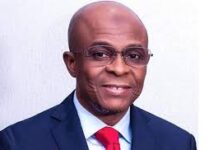The recent unveiling of MoneyMaster PSB by Globacom, the telecom industry transformational leader, has once again defines their ingenuity ,doggedness and resilience in deepening financial inclusion in the nation
According to financial analyst, Digital financial services, such as mobile money, represent a faster route to drive financial inclusion. While the requirements to open bank accounts – regulatory ID card, proof of residence – may be deemed onerous for the rural poor, the ownership of mobile phone and a sim card offers an easy access to financial inclusion.
However, mobile phones are ubiquitous in Nigeria, even in remote communities. It is estimated that there were 187.9 million sim connections in Nigeria as at January 2021. As seen in East Africa and neighbouring West Africans countries, mobile money products have resulted in moving a huge swath of the previously unbanked into the ranks of the financial included. In Nigeria, the uptake of mobile money has been abysmally low. Of the factors adduced for the low penetration of mobile money, the regulatory regime that was put in place by the Central Bank of Nigeria provided little incentives for mobile network operators to take the lead in creating mobile wallets. The Central Bank of Nigeria has now developed more friendly regulations, which recognise the role of digital financial products such as mobile money in driving its financial inclusion agenda
Interestingly ,the announcement of the commencement of Glo’s payment service bank business with the official launch of MoneyMaster PSB on October 6, 2022 was a welcome development that will invariable increase the penetration of mobile money in the country.
According to the World Bank, financial inclusion means individuals and businesses having access to basic financial services and products such as bank accounts, loans, and insurance, in a manner that is sustainable and affordable. When there is little or no access to these financial products or services, recourse is made to cash-based transactions – with its attendant risks – and savings are done through informal means, such as esusu, ajo or the local thrift collectors.
Having access to a transaction account is the first step in the road to financial inclusion. This could be in the form of a digital wallet or a bank account. With an account or a digital wallet, people or businesses can save, transfer, and receive money. Those with access to transaction accounts/wallets have better chances of saving for the rainy day, buying insurance products that can help them weather difficult seasons and can even benefit from government’s social investments, such as subsidies and grants.
Analyst has expressed that Financial exclusion is symptomatic of poverty and, in a perverse sense, further deepens inequality, but MoneyMaster PSB is one way to change that narrative and create equality in the system.
In a statement released by the Globacom noted that “our over-arching business objective remains to empower Nigerians by providing them with unlimited opportunities. MoneyMaster extends that objective as it targets the unbanked and under-banked with G-Kala its flagship product in order to deepen financial inclusion in Nigeria.”
MoneyMaster PSB was granted a payment service bank license by the Central Bank of Nigeria (CBN) on August 27, 2020 while,the PSB had since commenced commercial operations on May 30, 2022.
Payment service banks can, by virtue of their licenses, facilitate payment and remittance services within Nigeria, accept deposits from individuals and small businesses, issue debit and prepaid cards, operate electronic wallets, inbound remittances, and carry out other services in line with CBN regulations. They however differ from commercial banks in the fact that they cannot grant loans.
MoneyMaster will be leveraging Globacom’s pan-Nigerian spread and pervasive agents’ footprint in the rural and urban areas as it begins its massive roll-out.
To open an account, all the customer needs to do is dial *995# then follow the prompts from a Glo line or from any other telecommunications network as MoneyMaster PSB is network agnostic.
Just as Globacom revolutionized the telecom industry with cutting-edge technology and unique products when it started operations in 2003, MoneyMaster PSB is poised to redefine the payment service banks’ landscape while driving financial inclusion in Nigeria.
“One key feature of MoneyMaster’s G-kala product is that the customer’s phone number will be used as his or her account number,” the statement continued.
“We are grateful to the CBN for the opportunity to deepen financial inclusion in Nigeria using our cutting-edge technology and vast network.”
With 133.5m bank accounts in Nigeria as of December 2021 according to figures released by the Nigeria Inter-Bank Settlement System (NIBSS) and with only 54 million BVNs registered as of April 10, 2022, there is a huge gap of about 79m Nigerians and potential for PSBs like MoneyMaster to help bring many unbanked and under-banked into the financial services ecosystem.
Similarly just as Globacom broke New Grounds in Mobile Telephony, the company is set to do the same in the nation’s payment service banks’ system.
It could be recalled that Adenuga had during the Mobile telephony time declared then that the vision of Globacom is to build the biggest and best network in Africa. The company launched with all guns blazing. Soon, Globacom crashed the price of SIM cards – selling at N500. Nigerians were stupefied; oblivious that there was more where that came from. Then, it introduced the Per Second Billing, which MTN and Econet had claimed was impossible for the Nigerian market.
This move by Globacom would force the other telecom operators to also introduce the PSB. Consequently, this began the revolution that made mobile telephony not just an exclusive preserve of the privileged and well-heeled but, a necessity for Nigerians of all ages from the North to the South and everywhere in between. Globacom, a Proudly Nigerian company with the well-being of Nigerians as the core of its business principle, had come to stay.
From its early days, Globacom had always defied market odds to delight Nigerians. The company launched a slew of futuristic products and services such as being the first to offer 2.5G when others were on 2G, MMS, international SMS connectivity to over 804 networks in 174 countries, BlackBerry solutions, international prepaid roaming, voice SMS, personal ringback tunes, and Magicplus.
In 2010, the company stupefied Africa when it launched the Glo 1 submarine cable, a 9,800km cable stretching from the UK across West Africa with landing points in Nigeria, London, and Lisbon, and connecting different countries to the rest of the world. It was launched to provide tonnes of terabytes of data per second to West Africa and many European cities. In addition to boosting the provision of services to telecom end-users, the facility is currently providing much-needed connectivity to vital sectors of the economy such as oil and gas, manufacturing, banking, commerce, education, and health among others.
In recent years, Globacom has played a major role in the country’s march to a digital future by introducing a range of customised and community-driven voice and data connectivity solutions that help to manage complex networking systems. Globacom also provides secured as well as verticalised IT solutions such as E-Health, Smart Cognitive Learning, Smart Energy, Industrial IoT, and Cloud Applications.
These solutions are particularly useful for collaborations, device management, workgroup storage, and information security among others. Its fixed connectivity and voice products such as Boost and Next Generation Bandwidth-on-Demand connectivity, SIP-based voice trunk, and telephony, further enhance the company’s capacity to deliver advanced connectivity and fixed voice solutions to medium and large enterprises, large wholesale carriers, and ISPs in Nigeria and Africa.
In the last two years, Globacom has been carrying out an aggressive roll-out of network equipment and upgrade of its sites to 4G-LTE. This is intended to offer high speed and quality data experience to millions of Nigerians on the Glonetwork. The process covers the entire scope of telecoms infrastructure upgrade from the core network to access network, transmission and IP network, fibre network metro access and backbone infrastructure and passive equipment expansion like power and environment.
It also involves the rollout of new sites to increase network coverage in areas that need improvement and to also densifyand ease off already congested areas. This ultimately improves customers’ network experience and satisfaction in terms of service delivery, network quality, and coverage.
On completion of these projects, Globacom will have enhanced capacity to continue to provide world class and high-grade voice, data and VAS services to its teeming customers in Nigeria as well as its numerous roaming customers in-bound Nigeria and out-bound in other countries.
Globacom doesn’t just churn out television commercials to promote its brand and services; the telecoms giant ensures to produce inspiring and ingenious TVCs that portray and project Nigerians and Africans in good light and spur them to achieve their dreams. This it has done again with four new commercials.
Like Mozart’s peerless genius in classical music, Globacom is a leader by streets in setting the pace in producing inspiring and ingenious commercials that have become the high watermark by which other telecom operators are rated. Over the years, Globacom has, indeed, perfected the art of projecting the image of Nigeria and Africa, stoking the patriotic fire in citizens and motivating its teeming youth to reach beyond the stratosphere.
Nonetheless , the story of redefining the payment service banks’ landscape with MoneyMaster PSB and G-Kala will be a great one when the history of driving financial inclusion is written in the nation.























